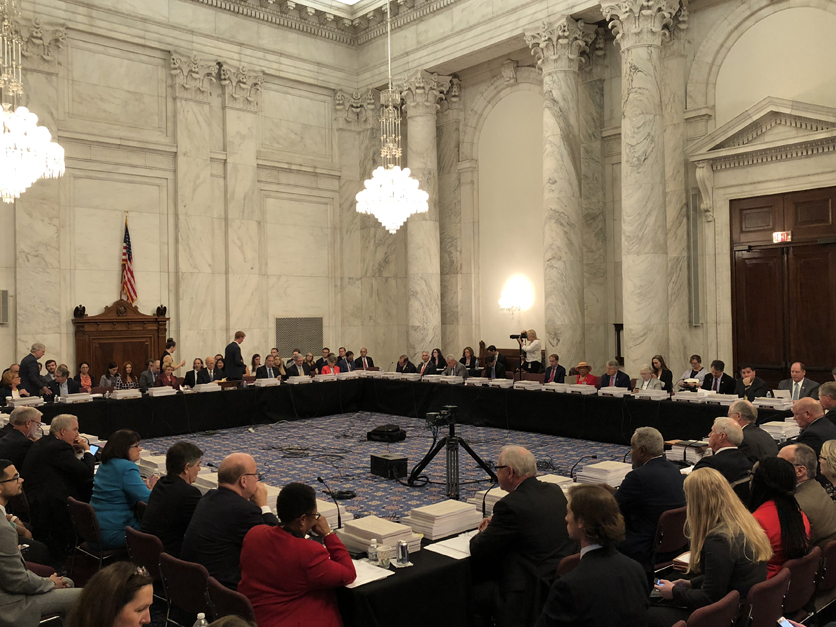Senate Majority Leader Mitch McConnell pressed farm bill negotiators to finalize an agreement as quickly as possible, but House Republicans used the conference committee’s first formal meeting to continue to press senators to accept tighter work requirements for food stamp recipients.
McConnell, who appointed himself to the conference committee, said at Wednesday's meeting that he wanted to send “a bipartisan, bicameral bill to the president’s desk that he’ll sign before the end of September.”
If that doesn’t happen, McConnell warned, “it’s going to be a bipartisan failure of extraordinary notice to the farmers and ranchers of our country.”
Senate Agriculture Chairman Pat Roberts, R-Kan., indicated during his opening remarks that the negotiators have yet to settle a number of key differences.
“We’re very close to the finish line but we still have a lot of work to do. Quite frankly, a lot of compromise remains to be done,” he said.
There was no discussion of possible compromises on nutrition assistance or other issues during the three-hour meeting, which was designed only to allow members of the conference committee, comprising nine senators and 47 House members, to make three-minute statements outlining their priorities.
But Roberts later met for two hours Wednesday afternoon with the other three leaders of the conference committee - House Agriculture Chairman Mike Conaway, Senate Agriculture Committee ranking Democrat Debbie Stabenow and House Agriculture ranking Democrat Collin Peterson - to continue the negotiations, which included discussion of a possible compromise on the work rules for the Supplemental Nutrition Assistance Program. "We had meaningful conversations about all the differences between the two bills," Conaway, R-Texas, told reporters afterward.
Peterson, of Minnesota, said the discussions included possible changes to the requirements for USDA to grant waivers to states from the work rules. "That’s one of the issues we talked quite a bit about today," Peterson said. All of eight states and parts of 28 others currently have waivers for able-bodied adults without dependents.
Conaway sought to emphasize at the morning meeting that he was willing to reach an agreement on every issue, including tightening work requirements for the Supplemental Nutrition Assistance Program. "Even on SNAP, I have repeatedly stressed that we are willing and able to come to consensus with the Senate," he said.
During the conference committee meeting Wednesday morning, the House Republican conferees almost uniformly called for expanding SNAP work rules, while Democrats argued against doing that. "What better time to build up an American workforce ... than when America's economy is booming?" Rep. Mike Rogers, R-Ala., asked rhetorically.
Shortly before the meeting, President Donald Trump provided some support for the House GOP position on work requirements with a Twitter post that said, “The Trump Economy is booming with help of House and Senate GOP. #FarmBill with SNAP work requirements will bolster farmers and get America back to work. Pass the Farm Bill with SNAP work requirements!” Vice President Mike Pence chimed in with a similar message on his Twitter feed.
Interested in more news about the farm bill, trade issues, pesticide regulations and more hot topics?
Sign up here for a four-week Agri-Pulse free trial. No risk and no obligation to pay.
Trump also brought up the farm bill and SNAP in a meeting Wednesday afternoon with GOP congressional leaders. "I also want to make sure we pass a farm bill, which is moving along nicely, before the end of the month to help our great farmers," Trump said. "I strongly support the commonsense work requirements and the food stamps in the farm bill. We'll see if we can get that. The farmers would like to get that."
During the conference committee meeting Wednesday morning, there was one notable exception to the party-line message on SNAP, from former House Agriculture Chairman Frank Lucas, R-Okla. While not addressing the House farm bill’s work provisions explicitly, he said he was “still waiting for the pilot projects that we set up in the last farm bill to yield their results.”
Those USDA-funded pilot projects, which are ongoing, are designed to test varying approaches to moving SNAP recipients into employment or better-paying jobs. The Senate version of the farm bill would leave the work rules alone while expanding the pilot projects.
A Democratic conferee, Rep. Maxine Waters of California, said the House bill “literally takes food from the tables of millions of low-income families who are struggling to make ends meet.”
There also were sharp differences within the conference committee on eligibility rules for commodity programs. Several Southern Republicans criticized provisions in the Senate bill that would tighten the requirements for qualifying for payments as a farm manager and reduce the income eligibility limit for payments to $700,000 from the existing cap of $900,000.
Sen. John Boozman, R-Ark., said tightening the limit on the number of subsidy recipients would "exacerbate the pain being felt throughout rural America.”
Rep. Jodey Arrington, R-Texas, said the lower income limit “is a threat to the safety net” for farmers.
Rep. Ralph Abraham, R-La., defended a provision in the House bill that would allow nieces, nephew and cousins of farmers to qualify for payments.
Priorities that conferees mentioned repeatedly during Wednesday’s meeting included funding programs to fight animal disease and expanding rural broadband assistance.
Missouri GOP Rep. Vicky Hartzler hit both of those priorities. She said negotiators should provide “full mandatory funding” for a foot-and-mouth disease vaccine and “do everything possible to ensure every American has access to high-speed internet.”
The House voted 392-20 in July to approve a Democratic motion to instruct the House conferees to support mandatory funding for the National Animal Disease Preparedness and Response Program, which would include a vaccine bank..
The program would get $450 million in mandatory funding over five years in the House-passed farm bill. The Senate version only authorizes funding for the programs, leaving it up to appropriators to decide spending levels on a year-to-year basis.
(Updated at 5:45 p.m. with comments on the afternoon meeting of lead conferees.)
For more news, go to: www.Agri-Pulse.com


